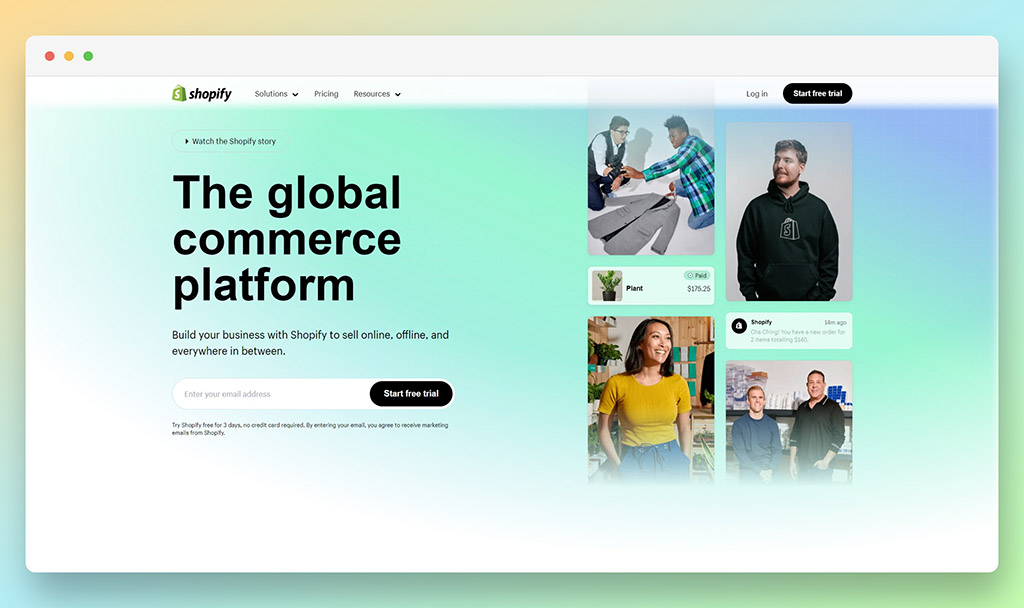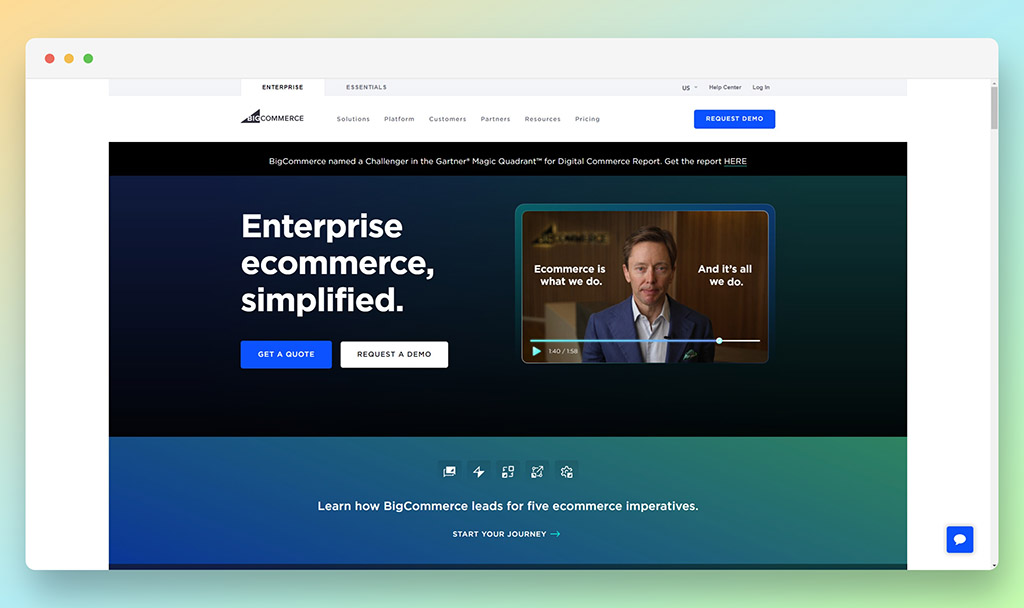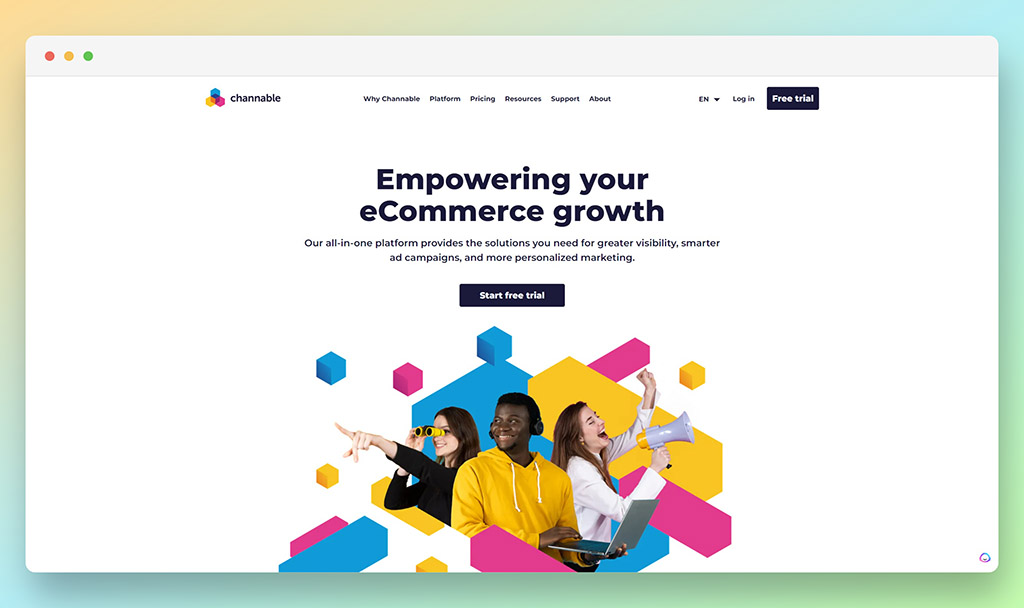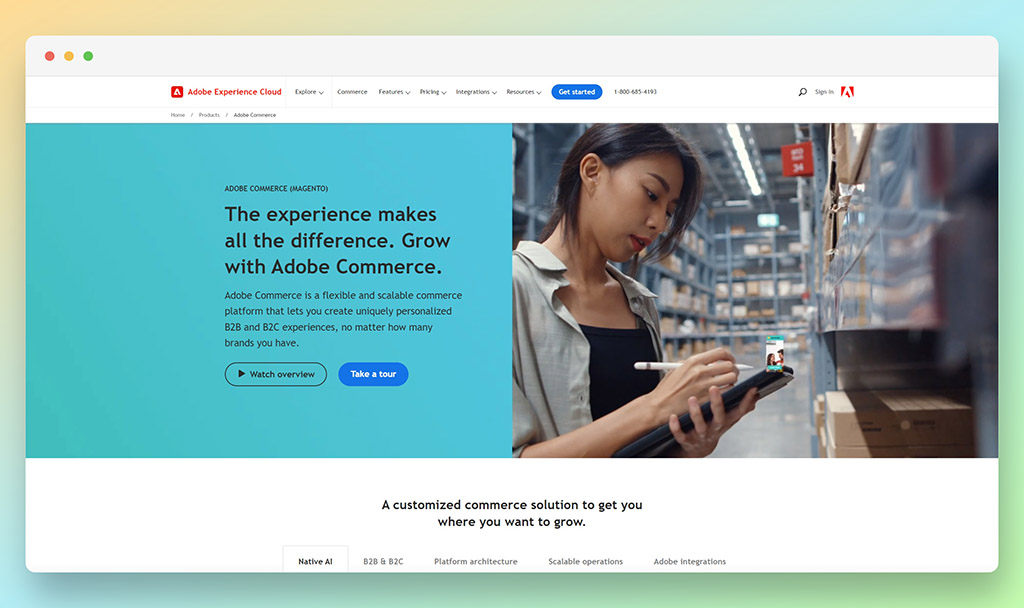If you’re looking for the top multichannel ecommerce platforms to help you increase your sales this year, you’re in the right place. While there are a lot of factors involving in building a successful ecommerce store, investing in the right number and variety of sales channels can be useful.
The more chances you have to connect with your audience and encourage them to make a purchase, the more opportunities you’ll have to increase your revenue. What’s more, a multichannel strategy ensures you can connect with a wider range of customers on their preferred platforms.
After all, some customers prefer to purchase products from marketplaces like Amazon and Ebay, while others like to shop on social media and ecommerce stores. The right multichannel ecommerce platform will allow companies to sell in all of these environments, without having to manage multiple platforms and tools separately.
Today, we’re evaluating some of the top platforms for multichannel ecommerce, to help you find the right solution for your store.
In this article:
- What is a Multichannel Ecommerce Platform?
- How to choose the Best Multichannel Ecommerce Platform?
- What are the Best Multichannel Ecommerce Platforms in 2023?
What is a Multichannel Ecommerce Platform?
A multichannel ecommerce platform is essentially an all-in-one solution for managing sales across various avenues. Most solutions give companies the tools they need to build their own dedicated ecommerce store, while also supporting transactions in various other environments, such as:
- Online Marketplaces: A multi-channel ecommerce solution may come with dedicated integrations for marketplace platforms like Amazon, Etsy, Walmart, Ebay, and similar solutions. They may allow companies to add listings to platforms instantly, synchronize inventory, and even share order information with fulfillment solutions like Amazon’s FBA.
- Social media platforms: The market for social commerce hit a value of $2.4 trillion in 2023. Multichannel ecommerce tools may allow companies to automatically list products on platforms like TikTok, Facebook, Instagram, and other shoppable environments.
- Offline stores: Some multichannel platforms support connections with offline and brick-and-mortar sales tools, like point of sale (POS) systems. They can synchronize inventory between an online and in-person location, and even allow companies to host pop-up stores.
Most multichannel ecommerce tools are cloud-based or SaaS solutions, which make it easy for companies to manage the backend operations of their store. They can unify multichannel inventory information, and even integrate with other tools for advanced functionality, such as customer support tools, ERP platforms, and CRM systems.
How to choose the Best Multichannel Ecommerce Platform?
As buyer journeys continue to evolve in the digital world, many ecommerce business owners are now investing in multi-channel ecommerce software. Most of the top ecommerce platform providers offer at least some integration and automation tools for multiple sales channels.
The right solution for you will depend on a number of factors, from which channels you want to access, to the features you need to manage your store, and your budget. We assessed a range of tools designed for small and large businesses alike, to bring you this list of the top competitors.
What are the Best Multichannel Ecommerce Platforms in 2023?
1. Shopify

Shopify is one of the most popular ecommerce solutions available today for a variety of reasons. Not only does it come with all the tools the average ecommerce business needs already built in, but it offers exceptional flexibility and scalability too.
With Shopify, you can create your own online store using a variety of templates and themes, access order management and inventory tools in your backend environment, and streamline fulfillment with a variety of automation tools. Shopify even offers solutions for selling across multiple geographies with Shopify Markets, and provides enterprise customers with headless technology via Shopify Plus.
With Shopify, you can share your product listings on marketplaces like Amazon, connect directly to various social media channels, and leverage a range of integrations for ecommerce management. There are even tools for print-on-demand, dropshipping, and fulfillment solutions.
Pricing
Shopify offers a 3-day free trial to beginners. The Basic plan for the ecommerce platform starts at $39 per month, although you can access it for $1 per month for the first 3 months. The standard Shopify plan is available for $105 per month, and Shopify Advanced costs $399 per month.
Notably, certain integrations may come with additional fees, and there are also transaction costs to consider if you’re not using Shopify’s own payment processor.
Learn more about the Shopify free trial.
Pros 👍
- Easy to use back-end for beginners
- No coding knowledge necessary
- Effortless integration with a range of channels
- Scalable plans to suit every business need
- Support for multiple payment methods
- Dedicated POS solution for offline selling
Cons 👎
- Customer service can be difficult to reach
- Advanced customizations might require expert support
2. Wix

Another extremely popular platform for ecommerce vendors, Wix is one of the easiest tools to use for beginners. It comes packed with user-friendly features to explore, including a drag-and-drop website builder, and a solution that uses AI to build your website for you.
Wix makes it easy to manage your product catalogue, order fulfillment requirements and other information in one convenient environment, with tons of integrations. You can also showcase an unlimited number of products on any plan, with countless variants per item.
Wix can connect with Google Shopping tools, marketplaces, as well as social media platforms. It also supports brick-and-mortar business with POS integrations. What’s more, it comes with portfolio, blog, scheduling, and branding tools already available to access.
Pricing
Wix offers a number of different pricing packages to suit various types of businesses. If you want to sell products with checkout and payment processing tools, you’ll need a “Business” plan. These options start at $27 per month with 20GB of storage space, and range all the way up to Business VIP for $59 per month. There’s also an enterprise option available at a custom price.
Pros 👍
- Easy-to-use website building tools with AI features
- Industry-leading integrations with Google, social media and more
- Advanced SEO tools for optimized online selling
- Analytics for tracking traffic, sales, and store activity
- Built-in tools for marketing and branding
- Support for both physical and digital products
Cons 👎
- Some limitations on scalability for larger companies
- Adjusting your templates can be difficult
3. BigCommerce

One of the most comprehensive solutions for ecommerce available today, BigCommerce aims to simplify the process of building a successful business, with an all-in-one SaaS tool. The flexible platform combines SaaS and API solutions to give you all the integrations you need to scale.
BigCommerce can support both online and offline selling, with point of sale integrations. It also comes with built-in SEO solutions, social media integrations for platforms like TikTok, and more. There’s even an entire section of apps on the BigCommerce marketplace dedicated to different sales channels. Companies can monitor all of their inventory and orders in a unified ecosystem.
Plus, you can connect BigCommerce with CRM and ERP tools, fulfillment channels, and other systems to help streamline and automate workflows.
Pricing
Like many ecommerce platforms, BigCommerce offers a free trial to business owners for 15 days, so you can test out the functionality before you commit to anything. Standard plans start at $39 per month, and range up to $299 per month for the “Pro” version of the platform. There’s also a custom-priced enterprise solution with access to headless commerce tools.
Pros 👍
- Plenty of tools for finding and engaging new customers
- Integrations with a wide range of tools and software
- Inventory syncing for different channels
- Open and flexible platform with API support
- Integrated order fulfillment and inventory tools
- Easy-to-use functionality for beginners
Cons 👎
- Some limitations on cheaper packages
- Customer support can be slow at times
4. Brightpearl

Created by the experts at Sage, known for its financial and accounting tools, Brightpearl is an ecommerce platform designed for scaling companies. The comprehensive solution provides businesses with the tools they need to automate and simplify countless workflows.
You can streamline everything from order fulfillment to multi-location inventory management and shipping or accounting using Brightpearl’s Automation engine. The solution also comes with access to AI-driven tools for inventory planning, sales forecasting, and cashflow management.
Brightpearl supports a range of plug-and-play integrations with sales channels like Shopify, TikTok, Ebay, Magento, BigCommerce, Amazon, and many others. It also offers business leaders a range of valuable analytical tools for tracking crucial metrics and KPIs like customer acquisition cost.
Pricing
Notably, Brightpearl doesn’t have a dedicated pricing page on its website. There are no specific plans to choose from. Instead, business leaders are encouraged to contact the customer service team for a demo. After completing the demo, you can receive a customized quote for your service based on your specific business needs, size, and customer base.
Pros 👍
- Powerful tools for sales and business automation
- Support for multiple warehouses and sales locations
- Integrations with a host of applications and platforms
- Training and support for all business owners
- In-depth analytics and reporting tools
- Excellent AI-driven features
Cons 👎
- No transparent pricing packages
- Slight learning curve for beginners
5. Channable

Channable advertises itself as a feed management and optimization tool for multi-channel sellers. The multi-channel listing tool comes with a range of tools designed to provide business owners with more visibility, personalization options, and smarter ad campaigns.
With Channable, companies can bring products to their target market across more than 2,500 channels worldwide. You can also promote your products globally, with powerful performance based PPC campaigns across a range of formats. What’s more, the platform also helps to increase marketplace sales with effortless optimization tools, and performance insights.
Designed specifically for ecommerce growth, Channable supports agencies, brands, and retailers alike, with a smart solution for PPC advertising, feed management, insights and analytics, marketplace integration, and more.
Pricing
Channable offers a variety of different pricing packages to suit various business owners. There are 10 initial packages to choose from, starting at $119 per month for the Starter plan, with 15 channels, 3 projects, and 15,000 items, and ranging up to $239 per month.
You can also purchase various add-on services, such as order syncing tools, advanced insights and analytics, and an automated repricer for an extra fee.
Pros 👍
- Powerful automations across a variety of channels
- Support for optimized PPC campaigns
- Comprehensive feed management tools
- Direct integrations with popular marketplaces
- In-depth performance insights and analytics
- Modern and easy-to-use interface
Cons 👎
- Pricing can be quite expensive for smaller businesses
- New companies might experience a slight learning curve
6. Ecwid

Ecwid is one of the few multichannel ecommerce solutions that allows creators and retailers to start selling online for free. The tool is designed to be extremely flexible, ensuring companies can sell on Google, Amazon, social media, or any other channel they choose. Plus, no matter how many platforms you leverage, you’ll be able to control your backend in the same unified environment.
The centralized platform supports synchronized inventory and order management, as well as listing tools, pricing customizations and more. With Ecwid, you can build an online store directly on the platform, or connect your ecommerce tools to any website instantly.
There’s support for various online marketplaces and social media platforms, as well as a point-of-sale integration option for physical stores. Plus, Ecwid has its own mobile apps available for iOS and Android, so you can control everything on the move.
Pricing
While Ecwid does have a free plan that lasts forever, you can only use it to create a online store for single-channel sales. If you want to create a multi-channel strategy, you’ll need one of the paid plans, which start at around $12.50 per month. More advanced plans come with extra support and custom development assistance for scaling sellers.
Pros 👍
- Incredible flexibility for multi-channel selling
- Support for sales across multiple currencies and geographies
- Real-time analytics and reporting tools
- Compatibility with countless social media platforms
- Excellent customer support and guidance
- Affordable pricing for beginners
Cons 👎
- Limited features for SEO and marketing
- Very basic capabilities on the free plan
7. Adobe Commerce

If you’re running a larger retail company, and want to access either multi-channel or omnichannel sales features, Adobe Commerce could be the perfect solution. Previously Magento and Adobe Commerce is an all-in-one ecommerce tool that aims to offer businesses a channel-free experience.
With this platform, you can natively integrate all of your sales solutions and tools into a cohesive environment, with cross-channel business intelligence, integrations and APIs, and comprehensive order management tools. Adobe Commerce allows companies to manage multiple geographic websites, channels, and brands from the same platform.
It also comes with access to automatic catalog updates and product syncing tools, as well as integrations with POS solutions and order fulfillment platforms. You can even create an entirely headless ecommerce environment if you like.
Pricing
Adobe Commerce has two pricing options to choose from. The first is Adobe Commerce Pro, intended for merchants of any business model or size. The second solution is the “Managed Services” plan, which includes support from experts, coaching, as well as advanced cloud infrastructure resources. Both plans are offered on a per-quote basis.
Pros 👍
- Wide support for B2B and B2C selling
- Excellent customization for online branding
- End-to-end order fulfillment and management tools
- In-depth insights and analytics
- Support for various payment methods
- Flexible integrations and APIs
Cons 👎
- No transparent pricing insights
- Complicated setup for beginners
8. Sellbrite

Marketed as the easiest way for retailers to sync their product catalog with a range of marketplace platforms, Sellbrite is a fantastic tool for small businesses. Online retailers can use the listing software to increase conversions in a range of environments.
Sellbrite offers one-click integrations with Amazon, Ebay, Shopify, Google, BigCommerce, Etsy, and countless other tools. It also includes an easy-to-use backend dashboard, where users can create and manage listings, control inventory, and fulfill orders.
The solution offers automatic synchronization, designed to improve the user experience, reduce the time you spend on product data, and prevent overselling. Plus, you can print shipping labels for a range of partners on the same platform.
Pricing
Sellbrite offers a free plan for up to 30 orders per month. Larger companies can choose one of the paid plans for additional orders, which start at $29 per month for 100 orders, and range up to $179 per month for 2,000 orders each month. There are also dedicated plans available for companies who want to boost their online sales via a Shopify plugin.
Pros 👍
- Robust inventory management software
- Rapid syncing for all of your storefronts
- Automatic updates for SKUs and product data
- Integrations with countless platforms
- Included shipping and fulfillment tools
Cons 👎
- Expensive pricing for high-volume retailers
- Limited analytical tools
Choosing the Best Multichannel Ecommerce Platform
Multichannel ecommerce solutions are powerful software solutions for online retailers, designed to sync product information across platforms, and enhance customer experience. With the right tool, you can increase your sales, automate complex business processes and more.
The right solution for you will depend on your target audience, sales strategy, and overall budget. Fortunately, many of the options above come with free plans so you can experiment with the service before you commit to a paid package.




Comments 0 Responses